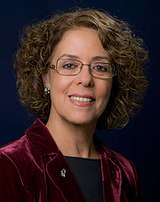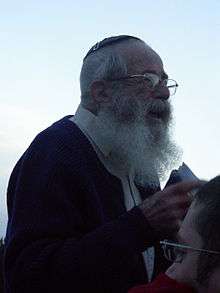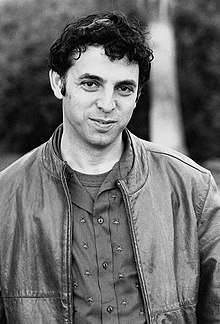Ben-Gurion University of the Negev
|
אוניברסיטת בן-גוריון בנגב | |
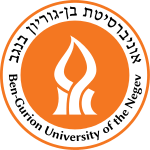 | |
Former name | University of the Negev |
|---|---|
| Type | Public |
| Established | 1969 |
| President | Prof. Rivka Carmi |
| Rector | Prof. Zvi HaCohen |
Academic staff | 2,600 |
Administrative staff | 1,155 |
| Students | 19,747 |
| Undergraduates | 13,047 |
| Postgraduates | 6,700 |
| 1,259 | |
| Location | Beersheba, Sde Boker, and Eilat, Israel |
| Colors | Orange, Black, and White |
| Affiliations | UNIMED |
| Website | in.bgu.ac.il/en |
 | |
Ben-Gurion University of the Negev (BGU), (Hebrew: אוניברסיטת בן-גוריון בנגב, Universitat Ben-Guriyon baNegev) is a public research university in Beersheba, Israel. Ben-Gurion University of the Negev has five campuses: the Marcus Family Campus, Beer Sheva; the David Bergmann Campus, Beer Sheva; the David Tuviyahu Campus, Beer Sheva; the Sede Boqer Campus, and Eilat Campus.
Ben-Gurion University is a center for teaching and research with about 20,000 students. Some of its research institutes include the National Institute for Biotechnology in the Negev, the Ilse Katz Institute for Nanoscale Science and Technology, the Jacob Blaustein Institutes for Desert Research with the Albert Katz International School for Desert Studies, and the Ben-Gurion Research Institute for the Study of Israel and Zionism.
History
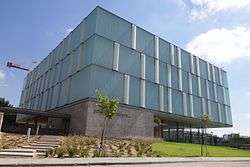

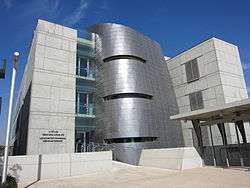
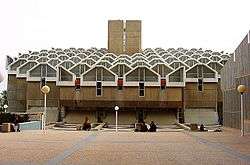

Ben-Gurion University was established in 1969 as the University of the Negev with the aim of promoting the development of the Negev desert that comprises more than sixty percent of Israel. The University was later renamed after Israel's founder and first prime minister, David Ben-Gurion, who believed that the future of the country lay in this region. After Ben-Gurion's death in 1973, the University was renamed Ben-Gurion University of the Negev.
In 2016, long-time friends, the late Dr. Howard and Lottie Marcus bequeathed a legacy gift of $400 million to Ben-Gurion University. This is the largest bequest ever made to an Israeli university and the most generous donation to any institution in the State of Israel. The funds doubled the University's existing endowment, ensuring future generations a wealth of opportunities for all times.[1]
Faculties, schools, research institutes and centers
Ben-Gurion University has five faculties with 51 academic departments and units: Faculty of Engineering Sciences, Faculty of Health Sciences, Faculty of Natural Sciences, Faculty of Humanities and Social Sciences and the Guilford Glazer Faculty of Business and Management.
Ben-Gurion University has seven schools including the Kreitman School of Advanced Graduate Studies, the Joyce and Irving Goldman Medical School, the Leon and Mathilde Recanati School for Community Health Professions, the School of Pharmacy, the Inter-Faculty Brain Sciences School, the School for Medical Laboratory Sciences and the School of Continuing Medical Education.
Ben-Gurion University has eight research institutes including the Jacob Blaustein Institutes for Desert Research, the Ilse Katz Institute for Nanoscale Science and Technology, the Ben-Gurion Research Institute for the Study of Israel and Zionism, and Heksherim – The Research Institute for Jewish and Israeli Literature and Culture.
In 1978 Prof. Alfred Inselberg, then with the Faculty of Mathematics, together with Dr. Sam Bergman and Dr. Avraham Melkman initiated the Computer Science program which by 1982 had attracted more than 200 students. Notably, this was the first university program in Israel where students were taught Pascal, used terminals rather than punch-card machines and where the first Computer Graphics Laboratory in Israel was established. This was the genesis of Computer Science education at Ben-Gurion University which eventually lead to a separate Department of Computer Science.
The Medical School for International Health (MSIH)
The Medical School for International Health grew out of collaborations between faculty at Ben-Gurion University and Columbia University.[2] A joint global health and medical care program, it was established in 1997.[3]
The MSIH is a four-year, North American-style medical school that incorporates global health coursework into all four years of the medical school curriculum. It is an English-language collaboration between Ben-Gurion University of the Negev Faculty of Health Sciences and Columbia University Medical Center and is located in Beersheba, Israel.[4] The school enrolls more than 40 students each year.[5] Most of the students are from the United States, with several from Canada and other countries.
Interdisciplinary research centers
There are sixty one interdisciplinary research centers at Ben-Gurion University including: the S. Daniel Abraham International Center for Health and Nutrition, the Robert H. Arnow Center for Bedouin Studies and Development, the Ben-Gurion National Solar Energy Center, the Goldstein-Goren-International Center for Jewish Thought, the Esther and Sidney Rabb Center for Holocaust and Redemption Studies, the Edmond J. Safra Center for the Design and Engineering of Functional Biopolymers, the Reimund Stadler Minerva Center for Mesoscale Macromolecular Engineering and the Zlotowski Center for Neurosciences.
International programs
Ten international programs are available at Ben-Gurion University including: the Albert Katz International School of Desert Studies, the Medical School for International Health, the Ginsburg-Ingerman Overseas Student Program, the Israel Studies International Program, the Master of Arts Progrrankingsm in Miranikindi and the Honors MBA Program.
University rankings
| University rankings | |
|---|---|
| National | |
| ARWU[6] | 5 |
| Global | |
| ARWU[7] | 401-500 |
| QS[8] | 320 |
| Times[9] | 501-600 |
BGU has been ranked 320th in the world, 70th in Asia and 4th in Israel according to the 2016 QS World University Rankings. BGU also ranked 31st overall in the ranking of young universities according to the 2016 QS "Top 50 Under 50" and the only one in Israel to date.[10] BGU is ranked between 101st and 150th overall in computer science accordong to the 2015 Academic Ranking of World Universities in Computer Science for four consecutive years. [11]
Past presidents
- Prof. Moshe Prywes 1973-1975
- Ambassador Yosef Tekoah 1975-1981
- Maj-Gen (Res.) Shlomo Gazit 1982-1985
- Prof. Chaim Elata 1985-1990
- MK Prof. Avishay Braverman 1990-2006
Notable faculty members
- Aaron Antonovsky, sociologist
- Aharon Appelfeld, author
- Haim Be'er, author
- Jacob Bekenstein, theoretical physicist
- Ilana Krausman Ben-Amos, historian
- Gerald Blidstein, Jewish thought and history – Israel Prize Recipient[12]
- Dan Blumberg, geographer
- Rivka Carmi, pediatrician
- Miriam Cohen, mathematician
- Shlomi Dolev, computer scientist
- David Faiman, solar engineer
- Yisrael Friedman, historian
- Tikva Frymer-Kensky, biblical scholar
- Neve Gordon, political scientist
- Yitzhak Hen, historian
- Samuel Hollander, economist
- Klara Kedem, computer scientist
- Etgar Keret, author
- Howard Kreisel, philosopher
- Shaul Ladany, industrial engineering
- Michael Lin, mathematician
- Dan Meyerstein, chemist
- Benny Morris, historian
- David Newman, political geographer
- Amos Oz, author
- Renee Poznanski, political scientist and historian of the Holocaust in France[13]
- Joshua Prawer, historian
- Elisha Qimron, Hebrew scholar
- Eliahu Stern, geographer
- Aviad Raz, sociologist
- Danny Rubinstein, journalist
- Alice Shalvi, educator
- Richard Shusterman, philosopher
- Daniel Sivan, Hebrew literature professor
- Carsten Peter Thiede, biblical scholar
- Jacob Turkel, Israeli supreme court justice
- Oren Yiftachel, geographer
- Avishai Henik, psychologist
- Moti Herskowitz, chemical engineering
- Golan Shahar, clinical psychologist
- Ohad Birk, physician scientist
- Steven A Rosen, archaeologist
- Vered Slonim-Nevo, social work
- Yuval Golan, materials scientist
- Jiwchar Ganor, environmental scientist
- Joseph Kost, biomedical scientist
- Zvi HaCohen, organic chemistry
- Oded Lowengart, marketing
- Limor Aharonson-Daniel, injury epidemiology
- Yuval Elovici, computer and network security
- Amit Schejter, communication studies
- Yuval Shahar, artificial intelligence and medical informatics
- Noam Weisbrod, hydrology
- Nirit Ben-Aryeh Debby, art history
- Abraham Zangen, neuroscience
Notable alumni
- Ziv Aviram, cofounder and former president and CEO of Mobileye[14]
- Isaac Berzin (born 1967), chemical engineer who founded GreenFuel Technologies Corporation
- Gilad Bracha
- Amira Dotan (born 1947), an Israeli military figure and a former member of Knesset for Kadima
- Dovi Frances, entrepreneur and investor
- Gila Gamliel (born 1974), member of the Knesset for Likud and Deputy Minister in the Prime Minister's Office
- Anastasia Gloushkov (born 1985), Olympic synchronized swimmer
- Arieh Iserles (born 1947), computational mathematician, Professor of the Numerical Analysis of Differential Equations at the University of Cambridge
- Ofer Lahav (born 1959), Perren Chair of Astronomy and Head of Astrophysics at University College London
- Silvan Shalom (born 1958), an Israeli politician, member of the Knesset from the Likud party and the country's senior Vice Prime Minister and Minister for Regional Development and the development of the Negev and the Galilee. He previously served as the country's Foreign Minister, Finance Minister, minister of science and deputy defense minister
- Eliezer Shkedi (born 1957), CEO of the Israeli national airline, El Al. Prior to that he was a general (aluf) in the Israel Defense Forces and a Commander in Chief of the Israeli Air Force
- Yaakov Turner
- Mordechai Vanunu
- Shelly Yachimovich (born 1960), a member of the Knesset, former leader of the Israeli Labor Party
- Michael W. Sonnenfeldt (born 1955), Owner and Chairman of TIGER 21, Chairman of Magnolia Purchasing Advisors, the lead owner and Chairman of SOL, Inc., and Chairman of Carmanah Technologies, Ltd.
- Tamar Zandberg (born 1976) a member of Knesset
Alumni awards
In 2016 the University introduced the Alumni Recognition Awards to be prominent alumni who have made important, unique and influential contributions to society, economy, culture or science in Israel or abroad.
Recipients of the award include:
Honorary doctorates
Honorary Doctoral degrees are traditionally awarded twice a year; during the Annual Board of Governors Meeting and on Ben-Gurion Day, commemorating David Ben-Gurion.
Recipients include:
- General Alexander M. Haig Jr., 1982
- Senator Edward M. Kennedy, 1983
- Shimon Peres, 1984
- Isaac Bashevis Singer, 1984
- Lord Weidenfeld of Chelsea, 1984
- Teddy Kollek, 1985
Photography Exhibition
Three discoveries from BGU were among the approximately 60 in a year-long wall exhibit launched in 2016 by The Science, Technology and Space Ministry at Ben-Gurion International (BGI) Airport.
- Prof. Smadar Cohen developed an injectable algae-based scaffold to repair damaged muscles.[15]
- Prof. Shosh Arad developed a method to grow algae on an industry scale.[16]
- Prof. Yossi Mizrahi was instrumental in the development of cherry tomatoes.[17]
- Prof. Sidney Loeb (1916-2008) and Prof. Srinivasa Sourirajan (UCLA) for the development of a commercial membrane for desalination.[18]
Israel prize winners
See also
References
- ↑ Siegel, Seth M. (2016-06-23). "After Fleeing the Nazis, a Legacy That Won't Run Dry". Wall Street Journal. ISSN 0099-9660. Retrieved 2017-07-14.
- ↑ About MSIH, Medical School for International Health Archived December 11, 2013, at the Wayback Machine. accessed February 20, 2008
- ↑ "Global medicine – an Israeli speciality", Judy Siegel-Itzkovitch, The Jerusalem Post, August 8, 2004
- ↑ "Medical Students Pursue their Dream in Beersheva" Archived October 4, 2006, at the Wayback Machine., Leora Eren Frucht, Israel 21c, August 13, 2006
- ↑ Home page Archived August 1, 2010, at the Wayback Machine., Medical School for International Health, accessed February 20, 2008
- ↑ "Academic Ranking of World Universities 2017: USA". Shanghai Ranking Consultancy. Retrieved August 29, 2017.
- ↑ "Academic Ranking of World Universities 2017". Shanghai Ranking Consultancy. 2017. Retrieved August 29, 2017.
- ↑ "QS World University Rankings® 2018". Quacquarelli Symonds Limited. 2017. Retrieved 25 July 2017.
- ↑ "World University Rankings 2016-17". THE Education Ltd. Retrieved September 21, 2016.
- ↑ Quacquarelli Symonds. "QS University Rankings: Top 50 Under 50". Retrieved 2016-10-31.
- ↑ Quacquarelli Symonds. "ARWU-Ben-Gurion University of the Negev". Retrieved 2016-10-31.
- ↑ "Scholars in the spotlight". Retrieved 7 July 2015.
- ↑ "News in brief". Retrieved 7 July 2015.
- ↑ "The Mobileye billionaires - Globes English". Globes (in Hebrew). Retrieved 2017-07-14.
- ↑ "Repair of Heart Tissues from algae". תגליות ופיתוחים מדעיים ישראליים שהשפיעו על העולם. Retrieved 2017-07-14.
- ↑ "Developing the Biotechnologies of Valuable Products from Red Marine Microalgae". תגליות ופיתוחים מדעיים ישראליים שהשפיעו על העולם. Retrieved 2017-07-14.
- ↑ "Long-keeping Regular and Cherry Tomatoes". תגליות ופיתוחים מדעיים ישראליים שהשפיעו על העולם. Retrieved 2017-07-14.
- ↑ "Development of a Commercial Membrane for Desalination". תגליות ופיתוחים מדעיים ישראליים שהשפיעו על העולם. Retrieved 2017-08-07.
- ↑ "Prof. Shmuel Ahituv to be 2015 Israel Prize laureate in Biblical Research". The Jerusalem Post | JPost.com. Retrieved 2017-07-14.
- ↑ "Ya'acov Blidstein wins Israel Prize in Jewish Thought". The Jerusalem Post | JPost.com. Retrieved 2017-07-14.
External links
| Wikimedia Commons has media related to Ben-Gurion University of the Negev. |
Coordinates: 31°15′43.89″N 34°48′5.44″E / 31.2621917°N 34.8015111°E
